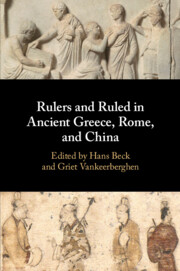Book contents
- Rulers and Ruled in Ancient Greece, Rome, and China
- Rulers and Ruled in Ancient Greece, Rome, and China
- Copyright page
- Contents
- Figures
- Tables
- Maps
- Contributors
- Preface
- Chronology of the Ancient Mediterranean
- Chronology of Ancient China
- Maps of Ancient China, Greece, and Rome
- The Many Faces of “the People” in the Ancient World
- Part I Authority and Lifestyles of Distinction
- Part II The People as Agents and Addressees
- Part III Inversions of the People: Emperors and Tyrants
- Chapter 8 Augustus, the Roman Plebs and the Dictatorship
- Chapter 9 Liberation as Burlesque
- Chapter 10 Historical Necessity or Biographical Singularity?
- Chapter 11 Employing Knowledge
- Part IV Identities and “Others”
- Glossary
- Index
- References
Chapter 8 - Augustus, the Roman Plebs and the Dictatorship
22 bce and Beyond
from Part III - Inversions of the People: Emperors and Tyrants
Published online by Cambridge University Press: 19 January 2021
- Rulers and Ruled in Ancient Greece, Rome, and China
- Rulers and Ruled in Ancient Greece, Rome, and China
- Copyright page
- Contents
- Figures
- Tables
- Maps
- Contributors
- Preface
- Chronology of the Ancient Mediterranean
- Chronology of Ancient China
- Maps of Ancient China, Greece, and Rome
- The Many Faces of “the People” in the Ancient World
- Part I Authority and Lifestyles of Distinction
- Part II The People as Agents and Addressees
- Part III Inversions of the People: Emperors and Tyrants
- Chapter 8 Augustus, the Roman Plebs and the Dictatorship
- Chapter 9 Liberation as Burlesque
- Chapter 10 Historical Necessity or Biographical Singularity?
- Chapter 11 Employing Knowledge
- Part IV Identities and “Others”
- Glossary
- Index
- References
Summary
In 22 bce, amidst a crisis caused by an acute grain shortage, the Roman populace offered the office of dictator to Augustus, who turned this offer down in a particularly dramatic fashion. He is said to have knelt before the people, imploring them to desist when they were pressing him to accept this invidious power. The grain shortage, as Augustus relates in the Res Gestae, was then quickly and successfully solved by him without resorting to dictatorship, with the help of a much more modest and specific power of ‘managing the corn supply’ which he agreed to take. The incident seems highly instructive as regards the public image that Augustus sought to project, the way he and his rule were regarded by the people, and the relations between him and the populace in the early years of his rule as princeps.
- Type
- Chapter
- Information
- Rulers and Ruled in Ancient Greece, Rome, and China , pp. 269 - 299Publisher: Cambridge University PressPrint publication year: 2021
References
- 1
- Cited by



